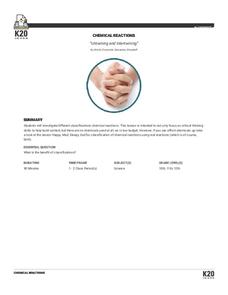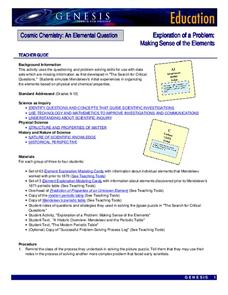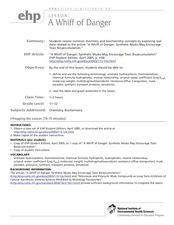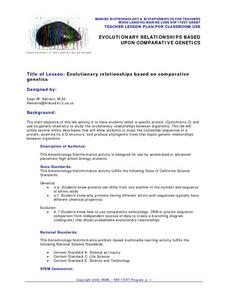K20 LEARN
Untwining And Intertwining: Chemical Reactions
What happened when the chemistry teacher told a bad joke? There was no reaction! A creative take on the traditional reaction types instructional activity invites learners to draw their own conclusions about how compounds and elements...
Chemistry Collective
Virtual Lab: Strong Acid and Base Problems
Strong acids and bases don't hesitate to dissociate! Your chemistry class won't hesitate calculating pH either, thanks to an engaging simulation. Individuals perform a series of pH determinations on paper, then use the virtual lab to...
Chemistry Collective
Virtual Lab: Unknown Acid and Base Problem
Looking for an easy way to give your class experience with acid-base chemistry outside the lab? Try a detailed interactive that puts them in total control! Young chemists determine the dissociation constant and concentration of an...
Chemistry Collective
Virtual Lab: Determining the Solubility Product
No chemistry lab? No problem! Scholars use a virtual lab to determine the solubility product of four different chemicals. They then use the results of their experiments to see if higher solubility product values equal greater solubility.
Chemistry Collective
Virtual Lab: Measuring the Heat Capacity of an Engine Coolant
Combine automotive science with chemistry! Young scholars investigate an alternative to the traditional engine coolant. They mix the chemicals virtually and collect data to determine the specific heat capacity.
NASA
Exploration of a Problem: Making Sense of the Elements
When given too much data to simply memorize, it helps to sort it into manageable groups. The second lesson in the six-part series of Cosmic Chemistry challenges groups of pupils to take a large amount of data and figure out how to best...
Biology Junction
Macromolecules
In chemistry, organic means something contains a carbon base. A helpful presentation starts by defining macromolecules as large organic carbon molecules. Scholars answer questions about each topic on the associated worksheet. It covers...
Cold Spring Harbor Laboratory
DNA Is Packaged in a Chromosome
Roger Kornberg, the oldest son of two biochemists, won the 2006 Nobel Prize in Chemistry. Learn about Kornberg and his scientific research with an animation, videos, biography, and an applied problem-solving activity. A summary and...
American Chemical Society
Liquids - Clearly Unique
Bring chemistry to life for scholars as they perform two tests to examine the unique properties of three liquids. Classroom investigators make observations, develop basic lab skills, and follow step-by-step instructions to compare water,...
Nemours KidsHealth
Fire Safety: Grades 3-5
Three lessons stress the importance of fire safety. Lesson one presents several articles listing fire safety do's and don'ts; using their newly-found knowledge, learners rewrite a newspaper article about a fire incident so that...
Teach Engineering
Balancing Liquid on a Coin: How Intermolecular Forces Work
Let knowledge of chemistry flow like water. Future scientists conduct two different experiments to investigate the properties of water. They learn about surface tension and cohesion as they see how many drops of water they can place on a...
Curated OER
Degradation and Weathering of Polymeric Materials
Learners investigate issues of degradation and weathering of polymeric materials during their useful life. They evaluate photodegradable plastics and their viability as an environmental solution for litter and investigate the qualitative...
Curated OER
Playing With Science
Young scientists investigate the scientific concepts and principles that help make common toys such as hula hoops, yo-yos, slinkies, and silly putty work. As a class, they read "Backyard Rocket Science, Served Wet" to get a look behind...
Curated OER
How Many Rocks Does it Take to Make a Light Bulb?
A really good worksheet on the periodic table of the elements is here for you. Learners must color in the elements listed in the worksheet that are needed to make a light bulb. They then answer questions about each of the elements.
Curated OER
Science Lesson for Grade 12
Twelfth graders perform dihybrid crosses and calculate phenotype and genotype ratios. In this series of science lessons, 12th graders explain the process of anodizing aluminum. They research on the benefits and harm caused by resonance...
Curated OER
Physical and Chemical Reactions - Factors Which Affect Reaction Rate
A total of five experiments lead chemistry pros to understand the difference between physical and chemical change. They also experiment with exothermic reaction factors that affect rate of reaction. The procedures are not written in the...
Teach Engineering
Basically Acids
Base your lesson plan on acids and bases on an informative resource. The first installment of a five-part module on the science behind Harry Potter has individuals investigate acid/base chemistry with the use of invisible inks. They also...
Curated OER
Alkene Reactions
In this chemistry worksheet, young scholars write structural formulas for the products and illustrate stereo chemistry when necessary. Then they write the structures for the molecular formulas given for reactants and products for each...
Curated OER
A Whiff of Danger
Public health trainees read and write a summary of the article, "A Whiff of Danger". The article is not available through the link, but can be found on the National Center for Biotechnology Information website. After summarizing,...
Curated OER
Discovering Elements
A periodic table of elements displays the elements in groups ordered by when they were discovered. Click-by-click, new elements are added, resulting in an almost up-to-date chart. In order to reinforce the idea that symbols are used in...
Curated OER
Balancing Equations Can Be Fun!
Young scholars participate in an online activity in order to master balancing equations before applying the concept to chemistry activities.
Curated OER
Cool Liquids
Chemistry neophytes use a temperature probe to assess the change as five different liquids evaporate. The implantation section suggests that they take readings every five seconds for a total of four minutes. They graph the data, look up...
Curated OER
Evolutionary Relationships Based Upon Comparative Genetics
Students investigate the protein cytochrome c in an attempt to use its genetic chemistry to study possible evolutionary relationships between organisms. The lesson integrates technology with the use computers to perform DNA analysis.
Curated OER
Reaction of Substituted Benzene
In this chemistry worksheet, students write the products for each of the reactions listed on the sheet. If there is no reaction they write N.R. There are 15 products to solve on the sheet.
Other popular searches
- Organic Chemistry
- Chemistry Chemical Reactions
- Chemistry Periodic Table
- Chemistry Equations
- Chemistry of Life
- History of Chemistry
- Chemistry Lesson Plans
- Organic Chemistry Projects
- Food Chemistry
- Chemistry Current Events
- Chemistry of Soap
- Water Chemistry

























